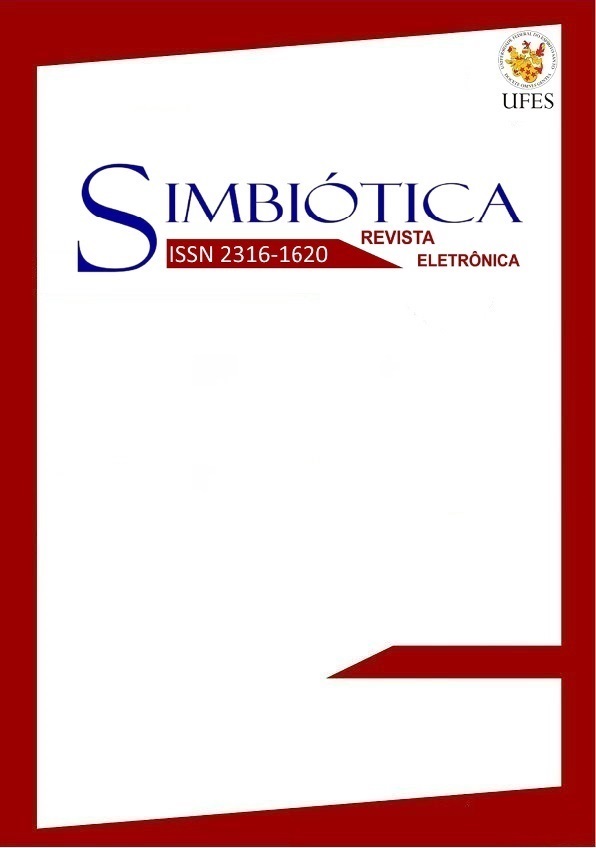La retórica en Laclau: perspectiva y tensiones
DOI:
https://doi.org/10.47456/simbitica.v6i2.28440Resumo
Este artigo analisa o papel central que Ernesto Laclau atribui à retórica em sua teoria da hegemonia. Além disso, são considerados certos problemas que derivam da concepção de linguagem em Laclau e de sua ideia de “retoricidade total” que impedem a análise crítica do uso de figuras retóricas e alguma limitação para pensar a agentividade dos sujeitos, em particular em seu papel de retor. Finalmente, postulamos a necessidade de pensar em graus de retoricidade e no reconhecimento de uma certa base de significações sedimentadas, que permitiriam a crítica, sem exigir a literalidade de uma linguagem “objetiva”, nem implicar a busca de uma sutura impossível.
Abstract
This paper analyzes the central role that Ernesto Laclau gives to rhetoric within his theory of hegemony. In addition, certain problems that have been derived from the conception of language in Laclau and from his idea of “total rhetoricity” are considered. These problems constrain the critical analysis of the use of rhetorical figures and some limitation to think about the agentivity of the subjects, particularly in their role of retor. Finally, we postulate the need to think about degrees of rhetoric and the recognition of a certain base of sedimented meanings, that would allow criticism, without demanding the literality of an “objective” language, nor imply the search for an impossible suture.
Keywords: Laclau; Rhetoric; Hegemony; Critic.
Palavras chaves: Laclau; Retórica; Hegemonia; Crítica.
Resumem
Este trabajo analiza el papel central que Ernesto Laclau otorga a la retórica dentro de su teoría de la hegemonía. Además, se consideran ciertos problemas que se han derivado de la concepción del lenguaje en Laclau y de su idea de “retoricidad total” que impiden el análisis crítico del uso de las figuras retóricas y cierta limitación para pensar la agentividad de los sujetos, en particular en su papel de retor. Finalmente, postulamos la necesidad de pensar en grados de retoricidad y en el reconocimiento de cierta base de significaciones sedimentadas, que permitirían la crítica, sin exigir la literalidad de un lenguaje “objetivo”, ni implicar la búsqueda de una sutura imposible.
Palabras claves: Laclau; Retórica; Hegemonía; Crítica.
Downloads
Publicado
Edição
Seção
Licença
Copyright (c) 2020 Javier Balsa

Este trabalho está licenciado sob uma licença Creative Commons Attribution-NonCommercial-NoDerivatives 4.0 International License.
Autores que publicam nesta revista concordam com os seguintes termos:
a. Autores mantém os direitos autorais e concedem à revista o direito de primeira publicação, com o trabalho simultaneamente licenciado sob a Creative Commons - Atribuição-NãoComercial 4.0 Internacional.
b. Compartilhar - copiar e distribuir o material em qualquer meio ou formato.
Adaptar - remix, transformar e construir sobre o material para qualquer finalidade, inclusive comercial.
c. Autores têm autorização para assumir contratos adicionais separadamente, para distribuição não-exclusiva da versão do trabalho publicada nesta revista (ex.: publicar em repositório institucional ou como capítulo de livro), com reconhecimento de autoria e publicação inicial nesta revista.
d. Autores têm permissão e são estimulados a publicar e distribuir seu trabalho online (ex.: em repositórios institucionais ou na sua página pessoal) a qualquer ponto antes ou durante o processo editorial, já que isso pode gerar alterações produtivas, bem como aumentar o impacto e a citação do trabalho publicado (Veja O Efeito do Acesso Livre).
Authors who publish in this journal agree to the following terms:
a. Authors retain the copyright and grant the magazine the right of first publication, with work simultaneously licensed under the CCreative Commons - Atribuição-NãoComercial 4.0 Internacional.
b. Share - copy and distribute the material in any medium or format.
Adapt - remix, transform and build on the material for any purpose, including commercial.
c. Authors are authorized to take additional contracts separately, for non-exclusive distribution of the version of the work published in this journal (eg, publish in institutional repository or as a book chapter), with acknowledgment of authorship and initial publication in this journal.
d. Authors are allowed and encouraged to publish and distribute their work online (eg.: in institutional repositories or on their personal page) at any point before or during the editorial process, as this can generate productive changes as well as increase the impact and the citation of the published work (See The Effect of Free Access).












